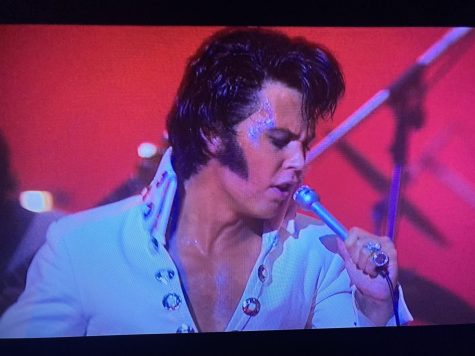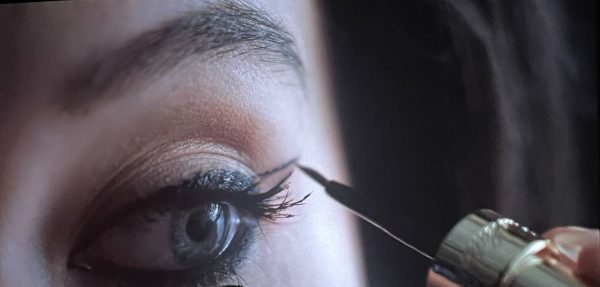“Elvis” Review: Austin Butler May Be Enough to Save This Biopic
Austin Butler, star of the Shannara Chronicles and Zoey 101, takes on a new role as Elvis Presley in the latest biopic to hit theaters.
In recent years, theaters have been filled to the brim with biopics, a movie dramatization of a public or historical figure. We have seen many including Bohemian Rhapsody, Respect and Rocketman. Director Baz Luhrmann took on the enormous task of bringing an enigma’s story to life on the big screen and did so in a flashy, unrelatable, chaotic way.
The establishing shot is of creepy dolls and pictures of presidents in the home of Tom Hanks’s character, Colonel Tom Parker. Shortly, thereafter we see a man fall and collapse to presumably his death beside the picture of an Elvis greeting card.
The story begins with Hanks’s narration. A montage of flashing headlines and shots of Elvis Presley’s health and mental state reveal the climax that the Colonel will be his manager, stealing fifty percent of the singer’s income. He is set early as the villain, working the singer to his literal death.
We see the perspective of the Snowman a.k.a Colonel Parker. He begins his managing career in the music industry with country but hears Presley on the radio and takes off in his blue car to find the star at a carnival. He pins him to a corner in the hall of mirrors with six reflections of Presely in the shot and bright lights above. The rock and roll artist has now become the yet-to-be revealed villain’s client.

He promises the Presely family that he will make them rich. A shot of the mother’s hand twirling the pen symbolizes betrayal and a moment that leads to the singer’s ruin.
“Don’t worry mama, it’s gonna turn out so, so good.” The gullible singer was wrong. Colonel Parker created merchandise and negotiated for his client to be in movies, all for his own gain.
There are small acts of rebellion sprinkled throughout the movie with Presley defying the Colonel, giving the audience some character development.
Presley is covered with replicas of the original outfits by the stylist and walks on stage with thousands of screaming, fainting women shown through moving squares on the screen.
The beginning song is Hallelujah. We hear “His truth is marching on” and a beautifully pitched high note from the actor, Austin Butler, dubbed over with the deceased singer’s voice.
Big bold letters are used to distinguish the scenes and different parts of the story. And, in comes that impressive big, bold country accent from Butler, adding a touch of realism to the story.
There is a comic-book style retelling of Elvis’s childhood with depictions of his jailed father in boxes filled with bubbled dialogue and drawn images of the characters. Then, the retelling slowly fades and we see the vibrant colors become dreary and realistic, a beautiful scene transition.
In enters a young Presley quickly drawn to the blues music his neighbors sang. “That’s Alright Mama” is the song that he falls in love with and starts his obsession with the genre. The knee-jerking and soul seizing dances of the blacks in his neighborhood captivated him.
The scene quickly fades back to the present, and an adult Presley shakes, preparing himself for a performance.
As the crowd murmurs in anticipation and curiosity, Presley, dressed in a bright pink suit, taps his black and white shoes on the wooden floor. He is wearing makeup, to the shock of the Colonel. Words softly echo from his mouth in a country twang as he introduces the song he will play. He breathes nervously paired with an unsettling screeching from the microphone. The men in the crowd berate him, but the women wait hungrily. Then, it begins. Austin Butler embodies the deceased star amazingly with his energized strumming of the guitar and Presley’s famous dance moves.

The movie uses this as the performance that jumpstarts Presley’s career, capitalizing on the singer’s and Austin Butler’s sex appeal.
There is an excellent use of color and music in each scene which brings the film to life.
However, the transitions of some scenes resemble more of a YouTube music video compilation than a movie.
Sounds of soulful singing are jarringly mixed with hip-hop beats. Yes, that is Doja Cat you hear in a movie about Elvis. She created the popular song “Vegas” for the movie.
Although this may seem like an attempt at modernization, it leads to the film struggling to find its place in time. The flashy bold lights in nearly every scene fail to help the case.
Blacks are seen casually next to jukeboxes and in the local bar as Elvis watches from the side in admiration.
The film addresses the widely held belief that Preseley was a racist. Many look to the phrase he allegedly said: “The only thing a colored person can do for me is buy my records and shine my shoes.” That may not have been the case, as the film clearly shows the singer’s reaction to racism and the death of Martin Luther King Jr.
In a scene where the death of Martin Luther King Jr. is announced, Presley stands up looking ill and slowly walks towards the screen with the song “The Edge of Reality” by Presely playing. The screen switches to a foggy purple background with a small clip of Presley spinning.
“Elvis” effectively blends events in the Rock N Roll artist’s life with tragedies that happened in the U.S.
Finally, we get to see deep beneath the star’s layers, when he is faced with the choice of prison or serving time in the army. The head of the singer is shaved in a black and white shot.
Austin Butler delivers a heart wrenching performance hugging his manager with tears streaming down after the death of the character’s mother.

Butler’s performance is aided by the fantastic job costume designers and makeup artists do in transforming him into Presley’s older self. Those piercing blue eyes and jet black hair become brighter and fuller as the movie ensues, and his face begins to have an uncanny resemblance to the singer.
Presley’s songs were used strategically, aiding in capturing the emotion Butler was acting.
Despite the many successes of this movie, it fell short of humanizing Presley. Nearly every shot is filled with overwhelming, flashy and unusual transitions making it too fast-paced for the audience to relate to the singer.
Luhrmann, the film’s director, lavished the audience with glitz and glam, instead of emphasizing Presely’s humanity and developing all the involved characters.
Two and a half hours of this film leave you feeling slightly drained and in need of a break. But, fortunately for this movie, Austin Butler’s accurate and awe-inspiring performance saves it.
Rating: 7/10
Tell us what you think in the comments. What rating would you give Elvis?

Lauren Braithwaite is currently a junior, majoring in Political Science with a minor in Digital Media and Journalism. At John Jay, Braithwaite is a member...














